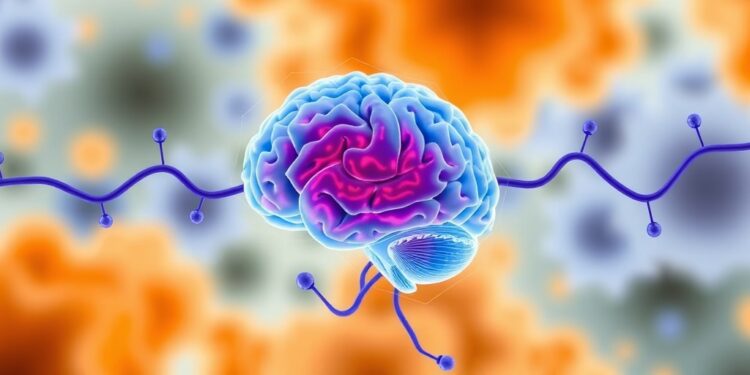
A groundbreaking study conducted by the research team at the Keck School of Medicine of USC has unveiled significant insights into the biomarkers associated with vascular dementia, providing fresh perspectives on the mechanisms that underpin cognitive decline. As vascular dementia represents the second most prevalent form of dementia following Alzheimer’s disease, understanding its etiology is crucial, particularly in light of the aging global populace that amplifies its public health relevance. The study, now published in the esteemed journal Alzheimer’s & Dementia®: The Journal of the Alzheimer’s Association, employed advanced imaging analyses and comprehensive cognitive assessments across diverse participant cohorts.
The study revolves around the intricate relationship between cerebral small vessel disease (cSVD) and vascular dementia, a linkage that has eluded definitive explanation despite ongoing investigations. The researchers hypothesize that disruptions within the glymphatic system—a crucial waste clearance mechanism in the brain—may be a key player in this cognitive deterioration. By analyzing brain scans from approximately 3,750 individuals, the research team utilized an innovative imaging technique known as Diffusion Tensor Imaging along the Perivascular Space (DTI-ALPS), which provided them with valuable data regarding glymphatic function and its correlation with cognitive performance.
What sets this research apart is its robust methodological framework, utilizing a substantial and varied participant pool drawn from multiple research cohorts, including the MarkVCID consortium, the University of California, Davis, and the Framingham Heart Study. Researchers employed DTI-ALPS to quantify the efficiency of the glymphatic system, measuring the diffusion of water in and around cerebral blood vessels. This sophisticated approach allowed for a more nuanced understanding of how glymphatic functionality correlates with cognitive capabilities, particularly executive functions—an area significantly impacted by the progression of dementia.
Crucially, the investigation revealed that individuals exhibiting lower DTI-ALPS scores tended to perform poorly in cognitive assessments. This finding suggests that glymphatic dysfunction may indeed precipitate cognitive decline, thereby establishing DTI-ALPS as a promising biomarker for assessing cSVD and its attendant cognitive impairments. Danny J. J. Wang, PhD, the study’s senior author and a prominent figure in neurology at the Keck School of Medicine, emphasized the significance of this discovery, noting the consistent correlation between DTI-ALPS results and cognitive functioning across all evaluated cohorts ranging from midlife to older adulthood.
The researchers took their analysis a step further by examining symptom progression within the participant groups. This exploration gleaned insights into the pathways through which glymphatic dysfunction may lead to cognitive deficits. The team’s findings indicate a potential trajectory: impaired waste clearance may lead to the accumulation of excess water in the brain, consequently resulting in tissue damage and cognitive decline. These insights underscore the imperative of further research to establish causality and illuminate the precise mechanisms at play.
The study’s findings also position the DTI-ALPS score as a compelling target for clinical research aimed at developing therapeutic strategies for vascular dementia. Enhancing glymphatic function emerges as a promising focal point, a notion supported by preliminary evidence suggesting that lifestyle alterations, such as improved sleep and increased physical activity, might foster glymphatic efficiency. Future investigations may explore pharmacological avenues to augment glymphatic function, potentially laying the groundwork for innovative treatments addressing both vascular dementia and Alzheimer’s disease.
As the global community grapples with the impending dementia crisis, characterized by escalating prevalence rates, these research revelations offer a glimmer of hope. The identification and validation of biomarkers such as DTI-ALPS not only deepen our understanding of cognitive decline mechanisms but also represent significant steps toward developing targeted interventions. The racial and ethnic diversity of the participant cohorts enhances the study’s generalizability, suggesting that the implications of the findings could extend across varied demographics.
In summary, this pioneering study sets the stage for future inquiries into vascular dementia and related cognitive disorders, forging a clearer path toward potential treatments grounded in empirical research. The role of the glymphatic system in sustaining cognitive health is underscored, reinforcing the necessity of multidisciplinary approaches in addressing the complexities of neurodegenerative diseases.
As researchers continue to dissect the intricate relationships between various biomarkers and cognitive health, the ultimate objective remains clear: to unravel the mysteries of dementia, paving the way for robust, effective strategies that foster brain health and enhance the quality of life for millions affected by these devastating conditions.
Subject of Research: Biomarkers for Vascular Dementia
Article Title: MRI free water mediates the association between diffusion tensor image analysis along the perivascular space and executive function in four independent middle to aged cohorts
News Publication Date: 30-Dec-2024
Web References: DOI Link
References: Not available
Image Credits: Not available
Keywords: Vascular dementia, biomarkers, glymphatic system, cognitive decline, Diffusion Tensor Imaging, Alzheimer’s disease.





